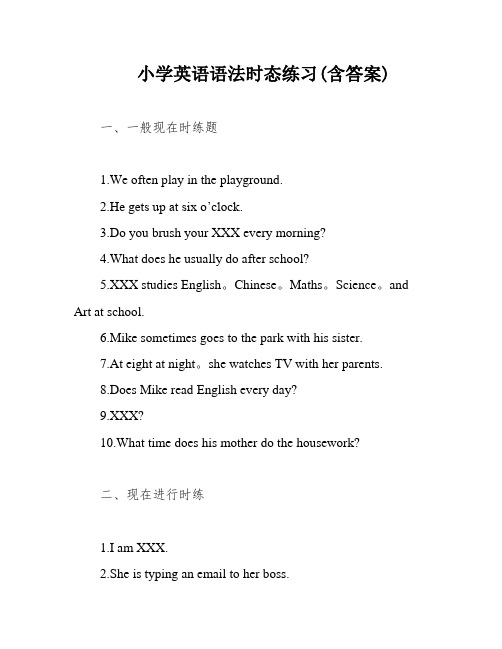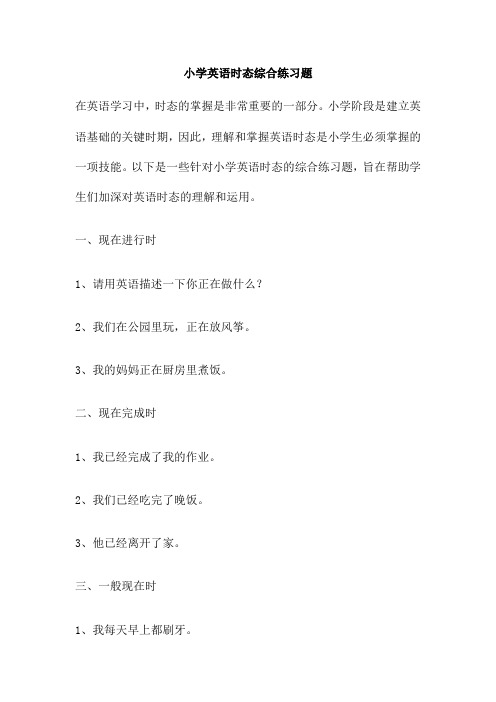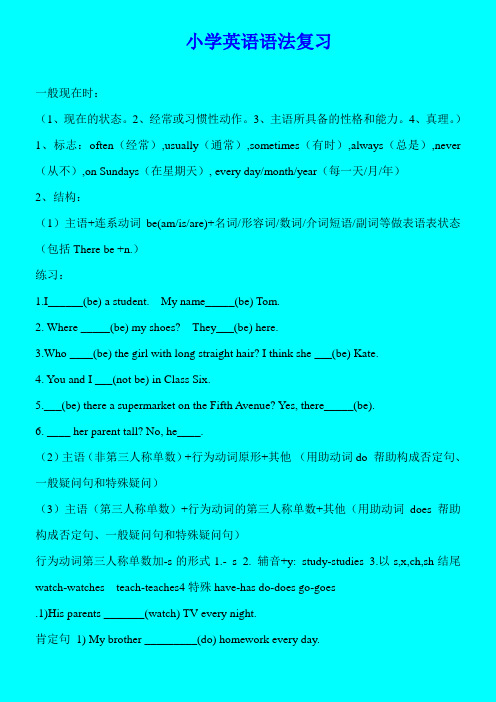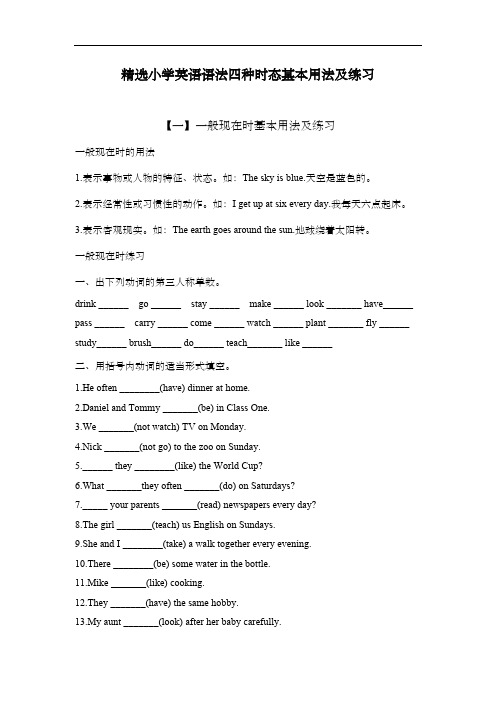小学英语语法及其各时态专项练习题
小学英语语法时态练习(含答案)

小学英语语法时态练习(含答案)一、一般现在时练题1.We often play in the playground.2.He gets up at six o’clock.3.Do you brush your XXX every morning?4.What does he usually do after school?5.XXX studies English。
Chinese。
Maths。
Science。
and Art at school.6.Mike sometimes goes to the park with his sister.7.At eight at night。
she watches TV with her parents.8.Does Mike read English every day?9.XXX?10.What time does his mother do the housework?二、现在进行时练1.I am XXX.2.She is typing an email to her boss.3.XXX.4.He is cooking dinner for his family.5.XXX.6.The dog is XXX.7.XXX.8.He is reading a book about history.9.XXX.10.XXX.1.I am not looking for a shirt。
I am looking for a tie.2.XXX.3.Miss Baker is XXX.4.What are you doing now。
I am XXX.5.It's nine o'clock。
My father is working in the office.6.Look。
the boy is putting the rubbish into the bin.7.Is he cleaning the classroom。
六年级英语时态与语态综合练习题30题

六年级英语时态与语态综合练习题30题1. I _____ to school by bus every day.A.goB.wentC.goesD.going答案:A。
一般现在时中,当主语是第一人称单数I 的时候,动词用原形go。
选项B 是一般过去时;选项C 是第三人称单数形式;选项D 是现在分词,不符合题意。
2. She _____ her homework last night.A.doB.didC.doesD.doing答案:B。
一般过去时中,动词要用过去式,do 的过去式是did。
选项 A 是一般现在时;选项C 是一般现在时第三人称单数形式;选项D 是现在分词。
3. We often _____ games after school.A.playB.playedC.playsD.playing答案:A。
一般现在时,主语是we,动词用原形play。
选项B 是一般过去时;选项C 是第三人称单数形式;选项D 是现在分词。
4. He _____ to the park yesterday.A.goB.wentC.goesD.going答案:B。
一般过去时,yesterday 是明显的过去时间标志,动词要用过去式went。
选项 A 是一般现在时;选项C 是一般现在时第三人称单数形式;选项D 是现在分词。
5. They _____ English every morning.A.studyB.studiedC.studiesD.studying答案:A。
一般现在时,主语是they,动词用原形study。
选项B 是一般过去时;选项C 是第三人称单数形式;选项D 是现在分词。
6. I _____ a book yesterday.A.readB.readedC.reads答案:A。
read 的过去式还是read。
选项B 错误;选项C 是一般现在时第三人称单数形式;选项D 是现在分词。
7. She _____ to music now.A.listenB.listenedC.listensD.is listening答案:D。
小学英语时态综合练习题

小学英语时态综合练习题在英语学习中,时态的掌握是非常重要的一部分。
小学阶段是建立英语基础的关键时期,因此,理解和掌握英语时态是小学生必须掌握的一项技能。
以下是一些针对小学英语时态的综合练习题,旨在帮助学生们加深对英语时态的理解和运用。
一、现在进行时1、请用英语描述一下你正在做什么?2、我们在公园里玩,正在放风筝。
3、我的妈妈正在厨房里煮饭。
二、现在完成时1、我已经完成了我的作业。
2、我们已经吃完了晚饭。
3、他已经离开了家。
三、一般现在时1、我每天早上都刷牙。
2、我们每周都去公园玩。
3、他每天晚上都读书。
四、一般过去时1、昨天我去了电影院。
2、上周我们去了海滩。
3、昨晚她看了电视。
五、一般将来时1、我明天将要完成作业。
2、我们下周将要去看电影。
3、他将在下个月搬到新家。
以上练习题旨在帮助学生理解和掌握基本的英语时态。
对于小学生来说,时态的学习可能相对复杂,但通过反复练习和实际应用,他们可以逐渐掌握并开始在日常生活中运用这些时态。
教师和家长可以鼓励学生多做类似的练习,帮助他们提高英语时态的理解和运用能力。
小学英语时态练习题一、一般现在时1、I eat apples every day. (我每天吃苹果。
)2、He studies hard every day. (他每天努力学习。
)3、They play basketball every week. (他们每周打篮球。
)二、现在进行时1、I am eating apples now. (我现在正在吃苹果。
)2、He is studying hard now. (他现在正在努力学习。
)3、They are playing basketball now. (他们现在正在打篮球。
)三、一般过去时1、I ate apples yesterday. (我昨天吃了苹果。
)2、He studied hard yesterday. (他昨天努力学习了。
)3、They played basketball yesterday. (他们昨天打篮球了。
外研小学英语时态练习题

外研小学英语时态练习题在小学英语教学中,时态是学生必须掌握的语法点之一。
以下是一些针对小学英语学生的时态练习题,旨在帮助学生巩固和练习不同时态的使用。
练习题一:一般现在时1. 我每天上学。
(I go to school every day.)2. 她喜欢跳舞。
(She likes dancing.)3. 他们经常去图书馆。
(They often go to the library.)练习题二:一般过去时1. 昨天我去了公园。
(Yesterday I went to the park.)2. 他昨天踢了足球。
(He played football yesterday.)3. 我们昨天晚上看了电影。
(We watched a movie last night.)练习题三:一般将来时1. 明天我要参加生日派对。
(Tomorrow I will attend a birthday party.)2. 她将要学习钢琴。
(She is going to learn to play the piano.)3. 他们下个月会去旅行。
(They will go on a trip next month.)练习题四:现在进行时1. 他正在读一本书。
(He is reading a book.)2. 我们正在看电视。
(We are watching TV.)3. 现在外面正在下雨。
(It is raining outside now.)练习题五:过去进行时1. 昨天下午三点钟,我正在做作业。
(At three o'clock yesterday afternoon, I was doing my homework.)2. 昨晚七点,他们正在吃晚饭。
(At seven o'clock last night, they were having dinner.)3. 他昨晚正在画画。
(He was drawing a picture last night.)练习题六:现在完成时1. 我已经完成我的作业。
小学英语语法复习动词时态专项讲解和练习

小学英语语法复习一般现在时:(1、现在的状态。
2、经常或习惯性动作。
3、主语所具备的性格和能力。
4、真理。
)1、标志:often(经常),usually(通常),sometimes(有时),always(总是),never (从不),on Sundays(在星期天), every day/month/year(每一天/月/年)2、结构:(1)主语+连系动词be(am/is/are)+名词/形容词/数词/介词短语/副词等做表语表状态(包括There be +n.)练习:1.I______(be) a student. My name_____(be) Tom.2. Where _____(be) my shoes? They___(be) here.3.Who ____(be) the girl with long straight hair? I think she ___(be) Kate.4. You and I ___(not be) in Class Six.5.___(be) there a supermarket on the Fifth Avenue? Yes, there_____(be).6. ____ her parent tall? No, he____.(2)主语(非第三人称单数)+行为动词原形+其他(用助动词do 帮助构成否定句、一般疑问句和特殊疑问)(3)主语(第三人称单数)+行为动词的第三人称单数+其他(用助动词does 帮助构成否定句、一般疑问句和特殊疑问句)行为动词第三人称单数加-s的形式1.- s 2. 辅音+y: study-studies 3.以s,x,ch,sh结尾watch-watches teach-teaches4特殊have-has do-does go-goes.1)His parents _______(watch) TV every night.2)His parents _________(not watch) every night.否定句2)My brother________(not do)homework every day.3)_____his parents_____(watch) TV every night?一般疑3)______ your brother _____ homework every day?Yes, they _______. No, they _______.Yes, he______. No, he _________.4)When___ his parents _____(watch) TV?特疑4)When _____ your brother ____(do) homework?5)They watch TV every night.He does homework every day.二.现在进行时:表示说话瞬间或现阶段正在进行的动作。
精选小学英语语法四种时态基本用法及练习

精选小学英语语法四种时态基本用法及练习【一】一般现在时基本用法及练习一般现在时的用法1.表示事物或人物的特征、状态。
如:The sky is blue.天空是蓝色的。
2.表示经常性或习惯性的动作。
如:I get up at six every day.我每天六点起床。
3.表示客观现实。
如:The earth goes around the sun.地球绕着太阳转。
一般现在时练习一、出下列动词的第三人称单数。
drink ______ go ______ stay ______ make ______ look _______ have______ pass ______ carry ______ come ______ watch ______ plant _______ fly ______ study______ brush______ do______ teach_______ like ______二、用括号内动词的适当形式填空。
1.He often ________(have) dinner at home.2.Daniel and Tommy _______(be) in Class One.3.We _______(not watch) TV on Monday.4.Nick _______(not go) to the zoo on Sunday.5.______ they ________(like) the World Cup?6.What _______they often _______(do) on Saturdays?7._____ your parents _______(read) newspapers every day?8.The girl _______(teach) us English on Sundays.9.She and I ________(take) a walk together every evening.10.There ________(be) some water in the bottle.11.Mike _______(like) cooking.12.They _______(have) the same hobby.13.My aunt _______(look) after her baby carefully.14.You always _______(do) your homework well.15.I _______(be) ill. I’m staying in bed.16.She _______(go) to school from Monday to Friday.17.Liu Tao _______(do) not like PE.18.The child often _______(watch) TV in the evening.19.Su Hai and Su Yang _____(have) eight lessons this term.20. -What day _____(be) it today? -It’s Saturday.三、按照要求改写句子。
小学英语语法时态归纳及练习(含答案解析)
英语时态归纳一、一般现在时:标志词:often(经常) sometimes(有时) always(总是) usually(通常) never(从不) every(每一)行为动词词型变化形式:一般现在时动词只有第三人称有词形变化;其他人称(第一人称:I, we;第二人称:you;第三人称复数:they、my friends)动词均用原形。
当主语是第三人称单数时,一般动词在一般现在时句子中的变化规律:1、多数在动词后加s:play—plays like—likes ,2、以s,x,sh,ch,o结尾的动词加es wash–washes catch–catches do–does3、以辅音字母加y结尾,把y改i再加es fly—flies study—studies4、以元音字母加y结尾,直接加s buy – buys5、不规则变化have—has一般现在时基本用法功能1.表示事物或人物的特征、状态。
如:The sky is blue.天空是蓝色的。
2.表示经常性或习惯性的动作。
如:I get up at six every day.我每天六点起床。
3.表示客观现实。
如:The earth goes around the sun.地球绕着太阳转。
The earth is round.构成1. be动词:主语+be(am,is,are)+其它。
如:I am a boy.我是一个男孩。
2.行为动词:主语+行为动词(+其它)。
如:We study English.我们学习英语。
句型肯定句:A.be动词:主语+ be + 其它成分He is a worker.B.行为动词:主语+动词(注意人称变化) +其它成分We like the little cat.否定句:A.be动词:主语+ be + not+其它成分They are not students.B.行为动词:主语+助动词(do/does) + not+动词原形+其它成分We don’t like the little cat.一般疑问句:A.be动词:Am / Is /Are +主语+ 其它成分Are you a teacher? Yes, I am. / No, I am not.Are they students of your school. Yes, they are / No they aren’t.B.行为动词:助动词(Do/Does)+主语+动词原形+ 其它成分Do you like it? Yes, I do. / No. I don’t .Does he(she) like it? Yes, he( she )does. / No, he ( she )doesn’t.特殊疑问句:疑问词+ 一般疑问句A.be动词:How many students are there in your school?B.行为动词:What do you usually do on Sunday?一般现在时动词be和have的变化形式1.动词Be 叫连系动词, 用法:第一人称单数用am,第三人称单数用is,其它人称用are。
小学英语语法例题及答案「时态」
小学英语语法例题及答案「时态」小学英语语法例题及答案「时态」英语语法经典例题:1.Lookatthatlittleboywanderingabout—perhapshe_____hismother.A.willloseB.islosingC.hadlostD.haslost2.It’sgoodthatwe_____totheparkbecauseit’sstartedtorain.A.don’tgoB.hadn’tgoneC.didn’tgoD.wasn’tgoing3.I_____forfiveminutes;whydon’ttheycome?A.amcallingB.calledC.wascallingD.havebeencalling4.You_____yourturnsoyou’llhavetowait.A.willmissB.havemissedC.aremissingD.hadmissed5.We_____tomovebutarestillconsideringwheretogoto.A.aredecidingB.decidedC.havedecidedD.haddecided6.Ileftmypenonthedeskandnowit’sgone;who_____it?A.tookB.hastakenC.willtakeD.hadtaken7.Theywon’tbuyanynewclothesbecausethey_____moneytobuyan ewcar.A.saveB.weresavingC.havesavedD.aresaving8.I_____yourlastpoint—couldyousayitagain?A.didn’tquitecatchB.don’tquitecatchC.hadn’tquitecatchD.can’tquitecatch9.You’llneverguesswhoImettoday—myoldteacher!We_____for20years.A.don’tmeetB.haven’tmetC.hadn’tmetD.couldn’tmeet10.IfeelsureI_____herbeforesomewhere.A.wastomeetB.havemetC.hadmetD.wouldmeet11.Theyhaven’tarrivedyetbutwe_____thematanymoment.A.areexpectedB.haveexpectedC.areexpectingD.willexpect12.Ithinkyoumustbemistakenaboutseeinghimatthetheatre;I’msurehe_____abroadallweek.A.isB.wasC.hasbeenD.hadbeen13.Thestudents_______busilywhenMissBrownwenttogetabooksh e_______intheoffice.A.hadwritten,leftB.werewriting,hasleftC.hadwritten,hadleftD.weerewriting,hadleft14.Itriedtophoneher,butevenasI_____shewasleavingthebuilding.A.phonedB.wouldphoneC.hadphonedD.wasphoning15.“Isupposeyou_____thatreportyet?”“Ifinishedityester day,asamatteroffact.”A.didn’tfinishB.haven’tfinishedC.hadn’tfinishedD.wasn’tfinishing16.—Didn’ttheguardseehimbreakingintothebank?—No,he_______intheotherdirection.A.waslookingB.hadlookedC.lookedD.islooking17.Howcanyoupossiblymissthenews?It_______onTValldaylong.A.hasbeenB.hadbeenC.wasD.willbe18.“Ithoughtyoumighthavegotdrunk.”“Yes,I______.”A.almosthaveB.almosthadC.almostdidD.mighthave19.You______television.Whynotdosomethingmoreactive?A.alwayswatchB.arealwayswatchingC.havealwayswatchedD.havealwaysbeenwatching20.“ItookpartintheTOEFL.Itwasreallyhard.”“Didyou_____ _alot?”A.HaveyoustudiedB.DidyoustudyC.HadyoustudiedD.Doyoustudy21.“What’syouropiniononthematter,please?”“Oh,sorry,I_______.”A.wasn’ttolistenB.haven’tlistenedC.wasn’tlisteningD.hadn’tlistened22.“Aha,you’reachainsmoker!”“Onlyathome.Nobody_______thatbutyou.”A.discoveredB.haddiscoveredC.discoversD.isdiscovering23.Thetelephone_______threetimesinthelasthour,andeachtimeit________formyfather.A.hadrang;wasB.hasrung;wasC.rang;hasbeenD.hasbeenringing;is24.Thethieftriedtobreakawayfromthepolicemanwho______him,butfailed.A.hasheldB.hadheldC.washoldingD.wouldhold25.WhenIarrivedatthecompany,themanager______,sowehadonlytimeforafewwords.A.justwentawayB.hadgoneawayC.wasjustgoingawayD.hasjustgoneaway26.“Johntookaphotographofyoujustnow.”“Oh,really?I______.”A.didn’tknowB.wasn’tknowingC.don’tknowD.haven’tknown27.“Mikeisnotcomingtothefootballgamethisafternoon.”“I t’sashame!He_______!”A.promisesB.promisedC.willpromiseD.hadpromised28.Pleasecallagain.Jim_______abathjustnow.A.hashadB.washavingC.ishavingD.has29.“WasAndrewtherewhenyouarrived?”“Yes,buthe______homesoonafterwards.”A.hadgoneB.hasgoneC.isgoingD.went30.“WhereisMother.”“She isinthekitchen.She_______theho useworkallmorning.”A.isdoingB.wasdoingC.hasdoneD.hasbeendoing31.Thebooks,________thedictionaries,mustbeputbackwherethey________.A.included;wereB.toinclude;areC.including;wereD.including;are31.选C。
小学四种时态试题及答案
小学四种时态试题及答案一、一般现在时1. 我每天上学。
A. go to schoolB. goes to schoolC. am going to schoolD. am going to go to school答案:A2. 他经常帮助别人。
A. He often help others.B. He often helps others.C. He often helped others.D. He often helping others.答案:B3. 我们喜欢游泳。
A. We like to swim.B. We likes to swim.C. We liked to swim.D. We liking to swim.答案:A二、一般过去时4. 昨天我去了图书馆。
A. I go to the library yesterday.B. I went to the library yesterday.C. I am going to the library yesterday.D. I go to the library yesterday.答案:B5. 他们上周看了电影。
A. They watch a movie last week.B. They watched a movie last week.C. They are watching a movie last week.D. They will watch a movie last week.答案:B6. 她昨天买了一本书。
A. She buy a book yesterday.B. She bought a book yesterday.C. She is buying a book yesterday.D. She will buy a book yesterday.答案:B三、一般将来时7. 明天我要去看医生。
A. I am going to see a doctor tomorrow.B. I go to see a doctor tomorrow.C. I went to see a doctor tomorrow.D. I will go to see a doctor tomorrow.答案:A8. 他们将要参加比赛。
小学英语语法练习题含答案
小学英语语法练习题含答案在小学英语教学中,语法练习是非常重要的一部分,它帮助学生掌握语言的基本规则。
以下是一些适合小学生的英语语法练习题,以及相应的答案。
练习题1:用正确的时态填空。
1. I am (be) at home now.2. She goes (go) to school every day.3. They played (play) soccer yesterday.答案:1. am2. goes3. played练习题2:选择正确的词填空。
1. This is/are my parents.2. There is/are a book and two pencils on the table.3. Does/Do your sister have a cat?答案:1. are2. is3. Does练习题3:用适当的疑问词填空。
1. What color is the sky?2. Where are you going?3. Who is your teacher?答案:1. What2. Where3. Who练习题4:用正确的形式填空。
1. She has/have a big family.2. I like/likes apples and bananas.3. They do/does their homework every evening.答案:1. has2. like3. do练习题5:改写句子为否定句。
1. He is a good student.2. We have a new computer.3. They play basketball after school.答案:1. He is not a good student.2. We do not have a new computer.3. They do not play basketball after school.练习题6:将下列句子转换为一般疑问句,并给出肯定和否定回答。
- 1、下载文档前请自行甄别文档内容的完整性,平台不提供额外的编辑、内容补充、找答案等附加服务。
- 2、"仅部分预览"的文档,不可在线预览部分如存在完整性等问题,可反馈申请退款(可完整预览的文档不适用该条件!)。
- 3、如文档侵犯您的权益,请联系客服反馈,我们会尽快为您处理(人工客服工作时间:9:00-18:30)。
小学英语语法及其各时态专项练习题一、一般现在时一般现在时基本用法介绍【No. 1】一般现在时的功能1.表示事物或人物的特征、状态。
如:The sky is blue.天空是蓝色的。
2.表示经常性或习惯性的动作。
如:I get up at six every day.我每天六点起床。
3.表示客观现实。
如:The earth goes around the sun.地球绕着太阳转。
一般现在时的构成(通常usually\often\everyday\sometimes)1. be动词:主语+be(am,is,are)+其它。
如:I am a boy.我是一个男孩。
2.行为动词:主语+行为动词(+其它)。
如:We study English.我们学习英语。
当主语为第三人称单数(he, she,it)时,要在动词后加"-s"或"-es"。
如:Mary likes Chinese.玛丽喜欢汉语。
一般现在时的变化1. be动词的变化。
否定句:主语+ be + not +其它。
如:He is not a worker.他不是工人。
一般疑问句:Be +主语+其它。
如:-Are you a student?-Yes. I am. / No, I'm not.特殊疑问句:疑问词+一般疑问句。
如:Where is my bike?2.行为动词的变化。
否定句:主语+ don't( doesn't ) +动词原形(+其它)。
如:I don't like bread.当主语为第三人称单数时,要用doesn't构成否定句。
如:He doesn't often play.一般疑问句:Do( Does ) +主语+动词原形+其它。
如:- Do you often play football?- Yes, I do. / No, I don't.当主语为第三人称单数时,要用does构成一般疑问句。
如:- Does she go to work by bike?- Yes, she does. / No, she doesn't.特殊疑问句:疑问词+一般疑问句。
如:How does your fathergo to work?动词+s的变化规则1.一般情况下,直接加-s,如:cook-cooks, play-plays2.以s. x. sh. ch. o结尾,加-es,如:pass-passes, wash-washes, watch-watches, go-goes3.以“辅音字母+y”结尾,变y为i, 再加-es,如:study-studies 一般现在时用法专练:一、写出下列动词的第三人称单数drink ________ go _______ stay ________ make ________look _________ have_______ pass_______ carry ____ come________ watch______ plant_______ fly________study_______ brush________ do_________ teach_______二、用括号内动词的适当形式填空。
1. He often ________(have) dinner at home.2. Mary and Tommy _______(be) in Class One.3. We _______(not watch) TV on Monday.4. Nick _______(not go) to the zoo on Sunday.5. ______ they ________(like) the World Cup?6. What _______they often _______(do) on Saturdays?7. _______ your parents _______(read) newspapers every day?8. The girl _______(teach) us English on Sundays.9. She and I ________(take) a walk together every evening.10. There ________(be) some water in the bottle.11. Mike _______(like) cooking.12. They _______(have) the same hobby.13. My aunt _______(look) after her baby carefully.14. You always _______(do) your homework well.15. I _______(be) ill. I’m staying in bed.16. She _______(go) to school from Monday to Friday.17. Liu Tao _______(do) not like PE.18. The child often _______(watch) TV in the evening.19. Su Hai and Su Yang _______(have) eight lessons this term.20. -What day _______(be) it today?三、按照要求改写句子1. Dad watches TV every evening.(改为否定句)___________________________________________________2. I do my homework every day.(改为一般疑问句作否定回答)_______________________________________________________3. I’m a teacher.(改为一般疑问句,作肯定回答)___________________________4. Amy likes playing computer games.(改为一般疑问句,作否定回答)___________________________________________________5. We go to school every morning.(改为否定句)_______________________________________________________ 6. He speaks English very well.(改为否定句)___________________________________________________7. John comes from Canada.(对划线部分提问)___________________________________________________8. She is always a good student.(改为一般疑问句,作否定回答) _______________________________________________________四、改错(划出错误的地方并圈上,将正确的写在横线上)1. Is your brother speakEnglish? __________________2. Does he likes goingfishing? __________________3. He likes play games afterclass. __________________4. Mr. Wu teachs usEnglish. __________________5. She don’t do her homework on Sundays. _________________二、现在进行时1.现在进行时表示现在正在进行或发生的动作,也可表示当前一段时间内的活动或现阶段正在进行的动作。
2.现在进行时的肯定句基本结构为be+动词ing.3.现在进行时的否定句在be后加not。
4.现在进行时的一般疑问句把be动词调到句首。
5.现在进行时的特殊疑问的基本结构为:疑问词 + be + 主语 + 动词ing?但疑问词当主语时其结构为:疑问词 + be + 动词ing?如:Who is running?动词加ing的变化规则1.一般情况下,直接加ing,如:cook-cooking2.以不发音的e结尾,去e加ing,如:make-making, dance-dancing 3.如果末尾是一个元音字母和一个辅音字母,双写末尾的辅音字母,再加ing,如:run-running, stop-stopping现在进行时专项练习:一、写出下列动词的现在分词:play________ run__________ swim _________make__________go_________ like________ write________ski___________ read________ have_________sing ________ dance_________put_________ see________buy _________ love____________ live_______ take_________ come ________ get_________stop_________ sit________ begin________ shop___________二、用所给的动词的正确形式填空:1.The boy __________________ ( draw)a picture now.2. Listen .Some girls _______________ ( sing)in the classroom .3. My mother _________________ ( cook )some nicefood now.4. What _____ you ______ ( do ) now?5. Look . They _______________( have) an English lesson .6.They ____________(not ,water) the flowers now.7.Look! the girls ________________(dance )in the classroom .8.What is our teacher doing? She _________(listen ) to music.9. It’s 5 o’clock now.We____________(have)supper now10.______Helen____________(wash )clothes? Yes ,she is .三、句型转换:1. They are doing housework .(分别改成一般疑问句和否定句)______________________________________________________________________________________________________________ 2.The students are cleaning the classroom . ( 改一般疑问句并作肯定和否定回答)______________________________________________________________________________________________________________3.I’m playing football in the playground .(对划线部分进行提问)_______________________________________________________ 4.Tom is reading books in his study . (对划线部分进行提问) 三、一般将来时一、概念:表示将要发生的动作或存在的状态及打算、计划或准备做某事。
